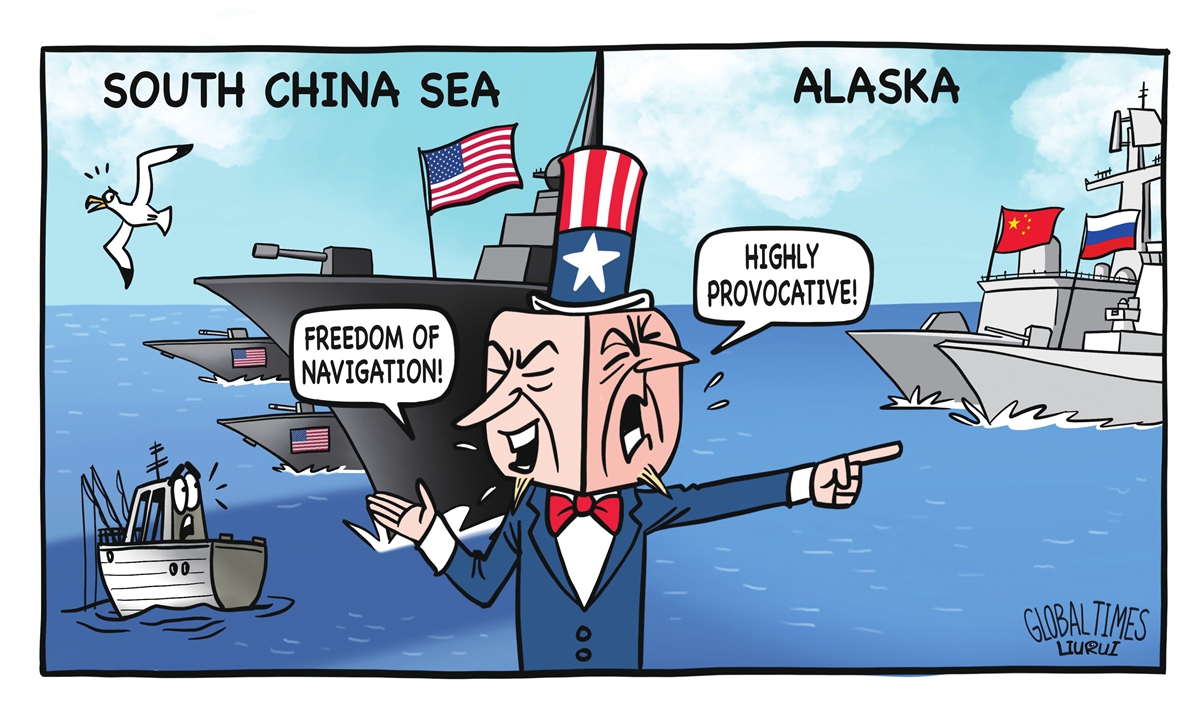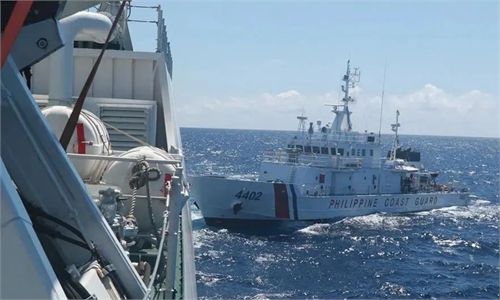
Two-faced. Illustration: Liu Rui/GT
The US, which prides itself on the so-called freedom of navigation, becomes alarmed when China and Russia exercise this same freedom.When covering a joint patrol of China and Russia, the Wall Street Journal (WSJ) run an article on Sunday entitled, "Russia and China Sent Large Naval Patrol Near Alaska." "This move is highly provocative," Brent Sadler, a senior research fellow at the Heritage Foundation and a retired Navy captain, was quoted as saying. Dan Sullivan of Alaska, a Republican member of the Senate Armed Services Committee, said the patrol was a reminder that the US has entered "a new era of authoritarian aggression," adding that the US' response in a similar scenario in September had been "tepid."
Nothing can better describe the US' reaction than "nonsense." The US could not even defend its own logic. If the China-Russia joint patrol was in international waters, how can it be viewed as a "provocation" or "aggression"?
The China-Russia joint patrol are exercising true freedom of navigation, because they have not intruded any other country's waters, unlike the US, Song Zhongping, a Chinese military expert and TV commentator, told the Global Times.
The relevant information has long been made public. China's Ministry of National Defense said in a press release on July 26 that in accordance with an annual cooperation schedule between the Chinese and Russian militaries, the two countries' navies would hold a joint naval patrol in West and North Pacific waters. The operation is not targeted against any third party and has nothing to do with the current international and regional situation.
As important regional powers and permanent members of the UN Security Council, China and Russia bear the responsibility of maintaining regional and global peace and stability. Safeguarding strategic security channels at sea is a common mission of the two countries, Song said. However, some US politicians are busy taking the case personally, believing the patrol is targeting the US.
The most ridiculous part is that three of the four destroyers, dispatched by the US to monitor Chinese and Russian ships, namely the USS John S. McCain, the USS Benfold, and the USS Chung-Hoon, have trespassed into Chinese territorial waters without permission. What qualifies the US, the redline breaker, to accuse China and Russia, who have been following international laws in the patrol? The US' response is equivalent to a high-profile declaration that the entire Pacific Ocean is an American lake. So, who is really the authoritarian aggressor?
Over the past years, the US has repeatedly trespassed into the territorial waters or adjacent waters of Chinese islands and reefs in the South China Sea and has continuously stirred up troubles and instability in the Indo-Pacific region. The US is the biggest threat to international maritime security and the world's security, Zhang Junshe, a senior research fellow at the Naval Research Academy of the PLA, told the Global Times. US politicians should feel ashamed for their gangster logic. They are basically saying that Chinese and Russian navies should stay in their ports while the US Navy can roam the world and establish military bases wherever and as many as they want, Zhang added.
This China-Russia joint patrol is a message to the US that China and Russia have a common security pursuit in this region and are fully capable of defending their interests. The Pacific Ocean is vast enough to accommodate the peaceful coexistence of different countries. It doesn't belong only to the US, and the US doesn't have the final say for the region.
Chinese and Russian navies have been to Alaska too limited times, such joint patrol should be carried out more frequently in a normalized manner, Song said. It is hoped that one day when the two navies pass through the Panama Canal or the Caribbean Sea, the US will uphold the same "freedom of navigation" standards as how it views its warships' operation in the South China Sea.
The world is heading toward multipolarity, and the US will only find out that its hegemony and authoritarian control over the world will face more and more questioning and challenges. The US will have to get used to it sooner or later.

